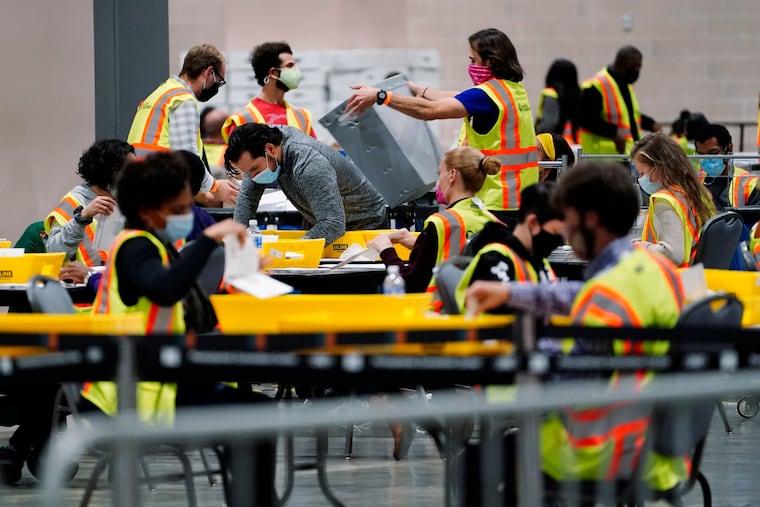To keep Pa. voters confident in our elections, rejecting misinformation is key | Opinion
An estimated 71% of eligible Pennsylvanians participated in the 2020 elections, a record high turnout.

The Pennsylvania House State Government Committee recently began a series of hearings on state election laws — ostensibly to learn more about the 2020 elections and with an eye toward improving the state’s future electoral process. It is difficult, however, to separate the causes and likely consequences of these hearings from past and ongoing efforts to sow doubt about election outcomes.
The 2020 elections were the most litigated in Pennsylvania’s history. Sixty-four of our state legislative leaders were signatories to a letter urging Congress not to accept our state’s votes. At least 21 lawsuits were filed against the counting of state ballots. These objections to our state’s Electoral College results ultimately failed, but not before an insurrection in our nation’s Capitol and eight of our state’s federal representatives voted to disqualify Pennsylvania’s electoral ballots.
» READ MORE: Pennsylvania’s 2020 election was really hard to pull off. This year won’t be much easier.
Like voters around the nation, Pennsylvanians cast ballots in November under extraordinary circumstances — not only did a highly competitive presidential election drive unprecedented surges in turnout and mail-in voting, but it did so amid a global health pandemic, an operational crisis in the U.S. Postal Service, and widespread social unrest fueled by racial injustice.
Many Pennsylvanians — despite being inundated with misinformation about mail-in ballots — voted by mail for the first time, an option made possible not by the pandemic, but by a bipartisan expansion of mail-in voting signed into law in 2019. Those who voted in person faced long lines and new COVID safety protocols.
How has all of this shaped the confidence of state voters? Do Pennsylvanians believe we had a fair, safe, and accurate election? A postelection survey conducted by Muhlenberg College in December offers important, and troubling, insight.
Roughly one in three voters say they are “not at all confident” that election results in our state were accurate. A closer look at voters’ concerns about the integrity of the electoral process reveals deep partisan divisions: 82% of Democratic voters are very confident that the election results were accurate, compared with 68% of Republicans. Most Republican voters (59%) identified voter fraud as the biggest threat to Pennsylvania’s election, whereas a plurality of Democratic voters (46%) identified voter suppression as the biggest concern.
Some Republican state lawmakers have indicated interest in repealing no-excuse mail-in voting. Pennsylvania voters are divided on the wisdom of this: 51% object to limiting mail-in voting, while 47% agree that limits should be put in place.
» READ MORE: Election reform must remain a priority for Pennsylvania | Editorial
Voters’ experiences clearly shape their views. Mail-in voters express significantly greater confidence in the fairness and accuracy of the 2020 elections: 84% of mail-in voters indicated they are somewhat or very confident in the final results of the state elections, but only 40% of in-person voters held the same view.
Trust in political institutions and confidence in the electoral process are prerequisites for a healthy democracy and an active citizenry.
While the Muhlenberg College survey findings and recent events point to troubling divisions, we are encouraged by two data points that transcend party affiliations:
A majority of both Democratic and Republican voters “strongly agree” that fake news and misinformation are serious threats to democracy.
An estimated 71% of eligible Pennsylvanians participated in the 2020 elections — a record high turnout. Among them, the Muhlenberg survey found, first-time and young voters reported the highest levels of confidence in the accuracy of the election. This is a positive sign for our democracy and well worth celebrating.
Our state lawmakers can help restore confidence and rebuild trust by clearly, unequivocally disavowing misinformation, even when the truth is politically inconvenient. They need to acknowledge the dangers of distrust in political institutions, highlight what went right during the last election cycle, dismiss unsupported claims of fraud, and broaden, rather than restrict, access to voting for Pennsylvanians.
The second impeachment and acquittal of former President Donald Trump — a process that prominently featured Pennsylvania elected leaders — only highlights the need for restoring trust in our electoral process.
After all, these efforts would benefit both Republicans and Democrats. No party remains in the majority forever — and both parties need voters who believe in the integrity of the electoral process.
Lanethea Mathews-Schultz is a political science professor at Muhlenberg College. She wrote this op-ed with input from Pennsylvania Post-Election Poll Project students Louie Horning, Tyler Mercado, Cynthia Noehrenberg, and Max Wengroff.